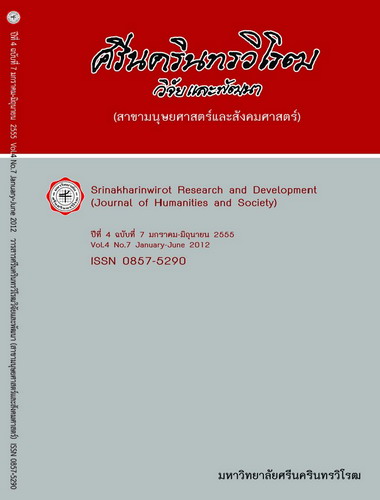พฤฒิพลังของผู้สูงอายุไทย การปันผลทางประชากร และโอกาสทางเศรษฐกิจของประเทศไทยในสังคมสูงวัย (ACTIVE AGEING OF THAI ELDERLY PEOPLE, THE DEMOGRAPHIC DIVIDENDS AND THAILAND’S ECONOMIC PROSPECT IN AN AGEING SOCIETY)
Keywords:
Active Ageing, Demographic Dividend, Economic Prospect, Ageing SocietyAbstract
บทตัดย่อ การปันผลทางประชากร หมายถึง ผลประโยชน์ทางเศรษฐกิจอันเกิดจากการเปลี่ยนแปลงโครงสร้างอายุของประชากร ทั้งนี้การปันผลทางประชากรสามารถแบ่งได้เป็น 2 ระยะ โดยการปันผลทางประชากรครั้งที่ 1 คือโอกาสทางเศรษฐกิจที่เกิดจากการเจริญเติบโตของสัดส่วนประชากรวัยแรงงาน ในขณะที่การปันผลทางประชากรครั้งที่ 2 คือโอกาสทางเศรษฐกิจที่เกิดจากการเจริญเติบโตของสัดส่วนประชากรวัยสูงอายุ ทั้งนี้ ประเทศไทยได้ก้าวเข้าสู่สังคมสูงวัยเป็นที่เรียบร้อย โดยประชากรวัยแรงงานของประเทศไทยได้มีสัดส่วนต่ำลงหลังจากปี พ.ศ.2553 เป็นต้นมา การเปลี่ยนแปลงดังกล่าวทำให้โอกาสในการได้การปันผลทางประชากรครั้งที่ 1 ซึ่งได้จากการใช้ประโยชน์จากประชากรวัยแรงงานที่มีสัดส่วนสูงขึ้นในการสร้างการเจริญเติบโตทางเศรษฐกิจของประเทศไทยหมดไป ดังนั้น ประเทศไทยจึงต้องเน้นการใช้ประโยชน์จากประชากรวัยสูงอายุที่มีสัดส่วนสูงขึ้นในการสร้างการปันผลทางประชากรครั้งที่ 2 และการเจริญเติบโตทางเศรษฐกิจของประเทศเป็นการทดแทน ด้วยสาเหตุดังกล่าว ผู้สูงอายุที่มีพฤฒิพลังทั้งทางด้านสุขภาพ ด้านการมีส่วนร่วม และด้านความมั่นคง จึงมีความสำคัญเป็นอย่างยิ่งต่อความสำเร็จในการขยายโอกาสทางเศรษฐกิจของประเทศไทยในสังคมสูงวัยต่อไป อย่างไรก็ตาม จากการพิจารณาสถานการณ์พฤฒิพลังของผู้สูงอายุไทยพบว่า ผู้สูงอายุไทยยังมีพฤฒิพลังในระดับที่ไม่สูงพอที่จะสร้างการเจริญเติบโตทางเศรษฐกิจให้แก่ประเทศไทยในสังคมสูงวัยได้อย่างมีนัยสำคัญและยั่งยืน เนื่องจากผู้สูงอายุจำนวนมากยังมีปัญหาด้านสุขภาพกาย ในขณะที่ผู้สูงอายุส่วนใหญ่ยังมีความมั่นคงด้านการเงินในระดับต่ำและไม่ยั่งยืนอีกด้วย
Abstract
A demographic dividend is an economic benefit arising from a change in population age structure. It can be divided into two phase. That is, the first demographic dividend is the economic benefit arising from the increasing proportion of working-age population, whereas the second demographic dividend is the economic benefit arising from the increasing proportion of old-age population. Thailand is now in an ageing society. Its proportion of working-age population starts declining after 2010. This change causes the depletion of the first demographic dividend of Thailand which can be obtained by capitalizing on the increasing proportion of working-age population to create the economic growth. As a result, Thailand, instead, must now focus on the capitalization on the increasing proportion of old-age population to generate the second demographic dividend and the economic growth. Active ageing of Thai elderly people in terms health, social participation and security, thus, is very necessary to extend Thailand’s economic prospect in the ageing society. Nevertheless, after considering the situation regarding the active ageing of Thai elderly people, we find that the active ageing of Thai elderly people is too low to generate the significant and sustainable economic growth for Thailand in an ageing society because a number of Thai elderly people still suffer from physical health problem. Most of them still have the low and unsustainable financial security.
Downloads
Downloads
Published
How to Cite
Issue
Section
License
Srinakharinwirot Research and Development Journal of Humanities and Social Sciences is licensed Under a Creative Commons Attribution-NonCommercial-NoDerivs 4.0 International (CC-BY-NC-ND 4.0) License, Unless Otherwise Stated. Please Read Journal Policies Page for More Information on Open Access, Copyright and Permissions.



